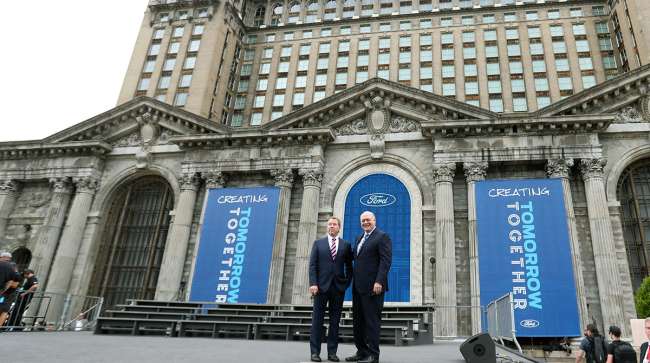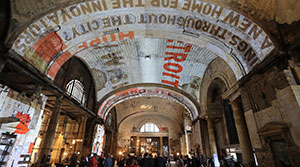Ford to Spend $740 Million as Part of Detroit Train Station Project

Ford Motor Co. will spend nearly $740 million to renovate the Michigan Central Station and other sites the automaker purchased in Detroit’s Corktown neighborhood, the company said Aug. 14.
Ford announced in June that it had bought the properties, including vacant land, to form a new tech campus in the neighborhood west of downtown that would focus on self-driving vehicles.
In a statement Aug. 14, Ford Land said the “total investment in the development of our five Corktown neighborhood sites … will cost approximately $738 million.”
The company also said it is “actively working with federal, state and local economic development groups and officials, seeking at least $250 million in tax or other incentives to support the development of the five Corktown sites.”

The interior of the station. (Carlos Osorio/AP)
The sites include Michigan Central Station, the Book Depository, a former brass factory, a former hosiery factory and development of 45 acres of vacant land.
The costs include “the building and land purchase, as well as expected building exterior and infrastructure rehab costs over the next four years, which takes into account the requirements of restoring a historic building such as the train station,” Ford said.
“The project would not be financially feasible without the support of incentives,” Ford Land said.
When Ford announced its plans for the train station, to much public fanfare, it said it envisioned as many as 5,000 people working there when the project is complete.
But the company had not said publicly how much it would invest in the project that likely will transform not only the train station but the entire neighborhood, one of Detroit’s oldest, which was hit hard by the city’s decline and only in the past few years has seen renewed investment in housing, restaurants and other businesses.
“We are excited by the opportunities that Ford’s investment in the train station and other key Corktown sites will bring,” Ford Land said Aug. 14, “not only for the larger resurgence of the Corktown neighborhood but all of southeast Michigan, including economic growth, attracting world-class talent and leading the development for the next generation of the automotive industry.”
Jerry Paffendorf, who was selected by his neighbors last month to join a nine-person Neighborhood Advisory Council — a citizen-based group tasked with working with Ford to ensure future Corktown developments take into account the needs and concerns of residents in the area — was energized.
“Tonight felt a little bit like a preseason game played on opening day of the regular season, which isn’t surprising since it was the first time the NAC members all had a chance to meet, and the public got to learn right along with us,” Paffendorf said of a community meeting Aug. 14 in which the investment details were made public.
“Ford gave a thoughtful presentation, which I encourage everyone to check out online, and shared some new information about the size of their investment and the tax credits they’re seeking. I came away feeling like everyone is excited to do this and that we’ll figure [it] out together.”
The Beaux Arts-style train station, designed by the same architectural firms as Grand Central Terminal in New York, opened in 1913 as the tallest train station in the world.
It served as Detroit’s main depot until it was closed by Amtrak in 1988.
Ford purchased the empty station from the Moroun family, which had owned it for about 25 years and had installed windows and, more recently, a freight elevator.
Executive Chairman Bill Ford outlined his vision for the renovations in June and said they included public access to the station’s waiting room.
“This beautiful space will be completely restored and be open to the public,” he said. “We’ll have restaurants and coffee shops and bars and retail all going on down here. We’re also going to work with the community to see what they would like to happen here. We don’t want to just be this corporate entity coming downtown. We want to be part of the fabric of Corktown.”
The station is listed on the National Register of Historic Places.
Distributed by Tribune Content Agency, LLC




